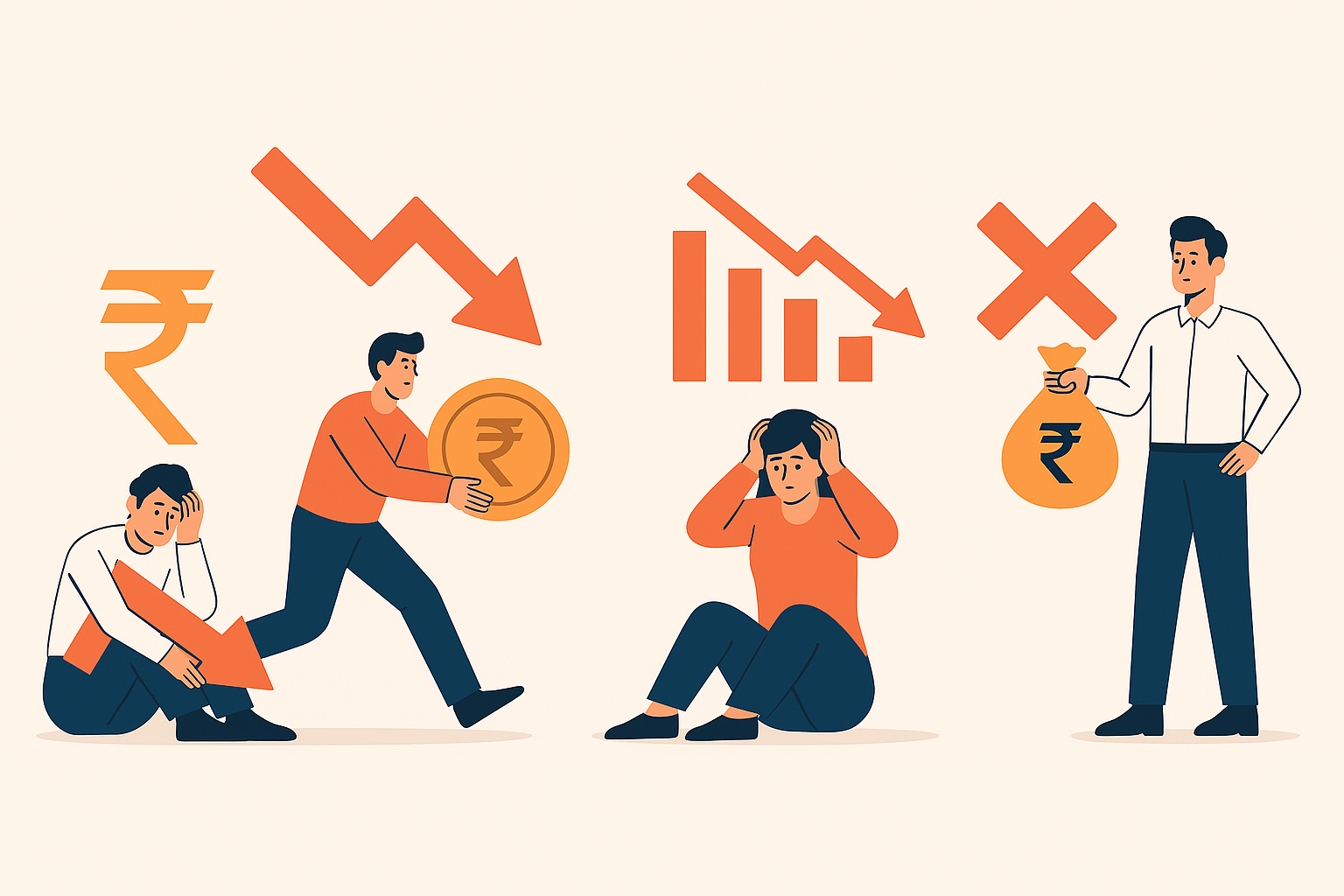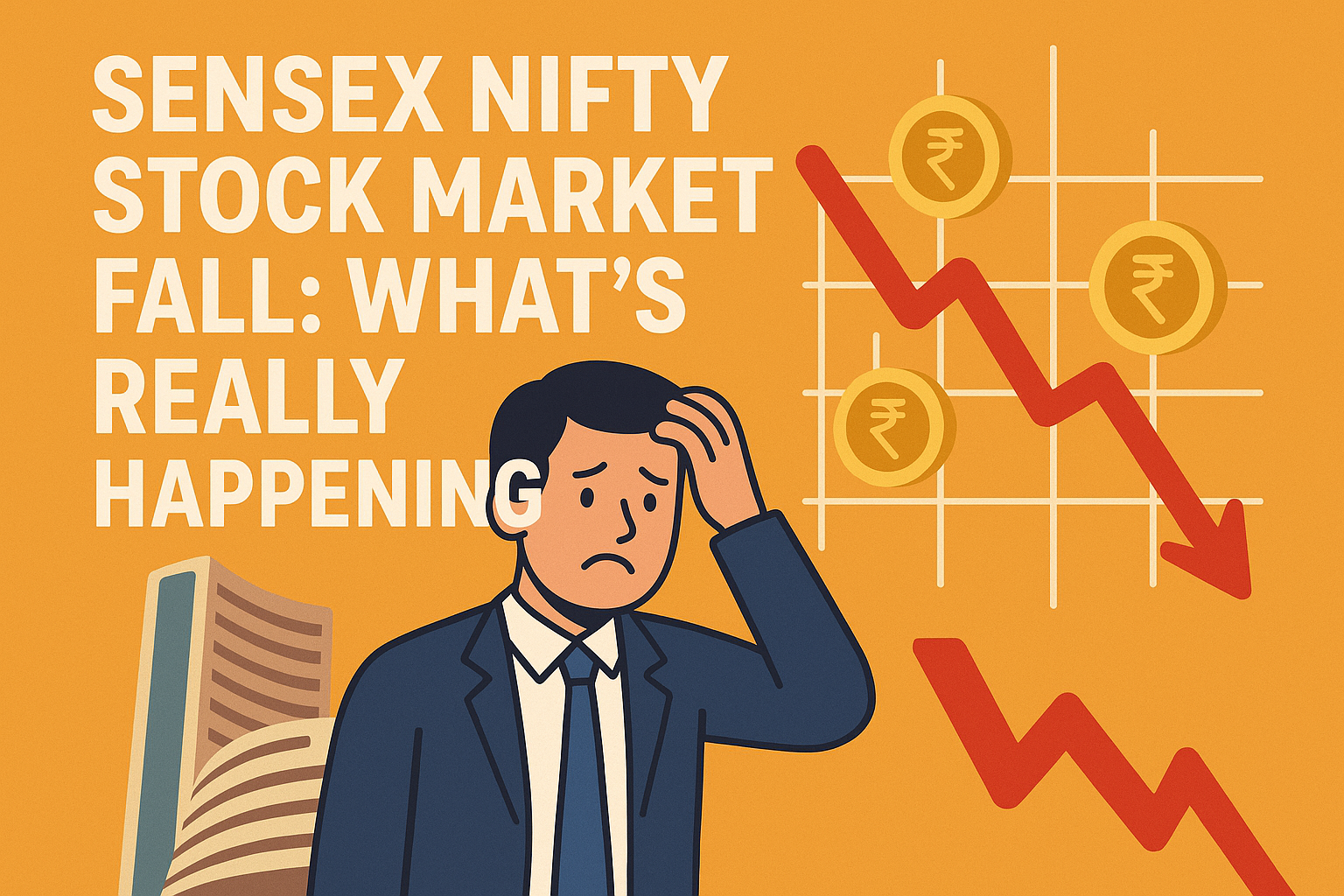Table of Contents
The sensex nifty stock market fall has left many investors worried and confused. Over the past few months, both the Sensex and Nifty have experienced significant volatility, leading to a sharp decline in their values. As someone who has been actively investing for the last five years, I felt that same pit in my stomach when I saw my portfolio turn red overnight. In this article, we’ll unpack the reasons behind the sensex nifty stock market fall, explore real-world examples, and discuss what you can do if you’re feeling stuck.
Understanding the Recent Sensex Nifty Stock Market Fall
The sensex nifty stock market fall didn’t happen overnight. Several factors contributed to it: global economic slowdown, rising interest rates, geopolitical tensions, and corporate earnings pressure. According to a recent Bloomberg report, tightening monetary policy by central banks worldwide has reduced the liquidity that previously supported stock markets.
When central banks like the Reserve Bank of India (RBI) raise interest rates, borrowing becomes more expensive. As a result, companies face higher costs, consumers spend less, and economic growth slows down. All of this together drags the stock market downward.
I remember checking my Zerodha app one morning and seeing my favorite blue-chip stocks down by 6–8% within hours. That’s when I realized this sensex nifty stock market fall wasn’t just a small correction—it was part of a larger global trend.
Global Events Triggering the Sensex Nifty Stock Market Fall
One of the key triggers behind the sensex nifty stock market fall was the conflict between Russia and Ukraine. The war led to a massive spike in crude oil prices, which directly impacted India, a major oil importer. According to Reuters, Brent crude oil touched $130 per barrel at its peak, the highest since 2008.
Higher oil prices translate into inflation, which forces central banks to hike rates to curb price rises. As inflation shot up to around 7% in India during 2024, the RBI aggressively raised the repo rate. Each rate hike hit investor sentiment hard, causing the Sensex and Nifty to tumble.
Similarly, tech stocks in the US also witnessed major sell-offs. The Nasdaq index, heavily weighted with technology companies, entered a bear market. Since Indian IT companies derive a significant portion of their revenue from US clients, panic selling spread into Indian markets too.
If you look at the Economic Times analysis, IT sector stocks like Infosys, TCS, and Wipro lost between 20–30% of their value during the worst phases of the sensex nifty stock market fall.
FII Outflows Deepened the Sensex Nifty Stock Market Fall
Foreign Institutional Investors (FIIs) have a huge impact on Indian equity markets. During the recent sensex nifty stock market fall, FIIs pulled out more than ₹2 lakh crore from Indian markets in just six months, according to Moneycontrol.
Why does this matter? FIIs typically invest in emerging markets like India when global interest rates are low. But when rates start climbing in developed economies, they pull back funds to safer assets like US bonds, leading to massive outflows.
I personally felt the heat when mid-cap and small-cap stocks in my portfolio crashed almost 40% from their peaks. It was like a slow bleed every day, watching values erode despite company fundamentals remaining solid.
Psychological Impact of Sensex Nifty Stock Market Fall on Retail Investors
The sensex nifty stock market fall doesn’t just impact numbers on a screen; it affects human emotions deeply. Retail investors, especially newcomers who entered during the 2021–2022 bull run, faced the harsh reality of stock market risks.
During casual conversations with friends, I noticed how confidence turned into fear. Many first-time investors, who had initially celebrated quick gains, suddenly started selling at losses out of panic. This is called “emotional investing,” and it often leads to poor decision-making.
Groww highlighted that during previous market crashes, most retail investors who stayed invested or continued SIPs ended up generating good long-term returns. Yet, during emotional times, it’s hard to stick to that wisdom.
Historical Perspective: Sensex Nifty Stock Market Fall Is Not New
The current sensex nifty stock market fall may feel alarming, but it’s important to remember that this isn’t the first time it has happened. In fact, if you study history:
- 2008 Financial Crisis: Sensex fell from 21,000 to 8,000 levels—a near 60% drop.
- 2016 Demonization Shock: Markets fell sharply but recovered within months.
- 2020 Covid Crash: Sensex dropped 38% within 40 days.
Each time, the market eventually rebounded stronger. As CNBC reports, patience during crashes often rewards disciplined investors handsomely over a 5–10 year horizon.
Personally, after losing nearly 35% during the 2020 crash, I learned the hard way that time in the market beats timing the market. It took almost two years, but my holdings not only recovered but doubled.
Key Sectors Hit Hard by Sensex Nifty Stock Market Fall
Several sectors bore the brunt of the sensex nifty stock market fall:
- Technology: As mentioned, Indian IT companies with heavy US exposure fell 20–30%.
- Banking: Rising interest rates squeezed margins, leading to stock declines.
- Real Estate: Higher loan rates dampened home buying sentiments.
- Consumer Goods: Inflation squeezed consumer spending.
According to Livemint, even defensive sectors like FMCG were not completely spared, although their fall was less steep compared to high-beta sectors.
However, one bright spot amid the gloom was the pharma sector. Healthcare demand stayed strong post-pandemic, providing relative stability to pharma stocks even during the broader fall.
Strategies for Surviving the Sensex Nifty Stock Market Fall
During any sensex nifty stock market fall, the key to survival isn’t timing the bottom but managing emotions and capital wisely. Based on my personal experience and lessons from market veterans, here are some effective strategies:
1. Stay Invested:
Exiting the market during panic often locks in losses. Markets move in cycles, and history shows recovery follows every fall. Motilal Oswal research suggests that missing even 5 of the best recovery days can drastically reduce long-term returns.
2. Diversify Your Portfolio:
I realized that putting all my money into one sector was a rookie mistake. Diversification across sectors like pharma, FMCG, and technology helped cushion my portfolio during the recent sensex nifty stock market fall.
3. Continue SIPs:
Systematic Investment Plans (SIPs) work wonders during volatile times by averaging out the purchase cost. According to ET Money, SIP investors who stayed consistent during previous crashes achieved much better wealth creation.
4. Avoid Frequent Portfolio Checks:
Constantly watching daily market fluctuations can trigger fear-based decisions. Limiting app checks to once a week helped me maintain mental peace during the worst days of the sensex nifty stock market fall.
5. Keep Emergency Funds Ready:
A separate emergency corpus ensures you won’t have to sell investments at a loss during personal crises, a crucial lesson I learned during the 2020 crash.
How SIPs Protected Investors During the Sensex Nifty Stock Market Fall
The beauty of SIPs is that they thrive during down markets. When prices fall, your SIP amount buys more units. Over time, this results in lower average cost and higher returns once markets recover.
For instance, my ₹5,000 monthly SIP in a mid-cap mutual fund showed negative returns during the first six months of the sensex nifty stock market fall. But by continuing SIPs unwaveringly, I ended up with a much bigger corpus when the market bounced back.
A Value Research report proved that investors who maintained SIPs during the 2008 crash and Covid crash saw up to 30% better returns compared to lump sum investors who panicked.
Expert Opinions on Sensex Nifty Stock Market Fall
Experts believe the sensex nifty stock market fall is painful but healthy for long-term market stability. According to Rakesh Jhunjhunwala, corrections shake off weak hands and pave the way for the next bull run.
Similarly, global fund managers like Morgan Stanley suggest that emerging markets like India still have strong fundamentals, including a rising middle class, stable political structure, and digitalization, which will drive future growth.
From a personal angle, I also attended an investor webinar where leading economist Dr. Arvind Subramanian mentioned that India’s GDP growth forecast remains above 6%, even after factoring in the recent shocks. This provides hope that the recovery may be faster compared to past crashes.
Should You Invest Now or Wait?
One of the biggest dilemmas during a sensex nifty stock market fall is whether to invest more or wait for further declines. I faced this same decision in March 2020 and again now.
Here’s a simple framework that helped me:
- If you have a long-term horizon (>5 years), incremental buying during dips can yield superior returns.
- If you need money within 1–2 years, it’s better to stay cautious and stick to safer assets like liquid funds or fixed deposits.
According to Nippon India Mutual Fund, trying to perfectly time the bottom is impossible. Even professional fund managers admit they can’t always catch the exact lows.
During the 2020 Covid crash, I started investing slowly every time the Nifty dropped by 500 points. This phased approach, called “value cost averaging”, helped me avoid catching a falling knife and build positions gradually.
If you’re a first-time investor, consider consulting a SEBI-registered financial advisor before taking action.
Common Mistakes to Avoid During Sensex Nifty Stock Market Fall

While panic is natural, there are some common mistakes you must actively avoid during a sensex nifty stock market fall:
- Selling quality stocks at a loss: Stocks with strong fundamentals tend to recover faster and stronger.
- Going all-in at once: Spread your investments over weeks or months to average costs.
- Borrowing money to invest: Leverage can magnify losses during volatile periods.
- Ignoring asset allocation: Maintain a healthy mix of equities, debt, and gold even during emotional times.
Many investors who sold their equity holdings at the bottom of the 2020 crash missed the historic recovery that followed. Trust me, missing those gains hurts a lot more than riding out the volatility.
Case Study: How I Navigated a Sensex Nifty Stock Market Fall
Let me share a real example. Back in March 2020, when the Nifty fell below 8,000 levels, fear was everywhere. WhatsApp groups were filled with horror stories of stock crashes. I too panicked and sold half of my holdings.
But after attending an online webinar hosted by Upstox, I realized my mistake and decided to re-enter the market gradually. I invested ₹10,000 every month into index funds for the next year.
The result? By December 2021, my portfolio grew by 82%.
This taught me that in every sensex nifty stock market fall, the real battle is psychological, not financial.
Frequently Asked Questions (FAQs) About Sensex Nifty Stock Market Fall
1. Why does the Sensex Nifty stock market fall happen suddenly?
The sensex nifty stock market fall can happen suddenly due to a combination of factors like global economic shocks, geopolitical tensions, corporate earnings disappointments, or sharp policy changes. For instance, the recent aggressive interest rate hikes by global central banks triggered an unexpected sharp correction.
2. Is it wise to buy stocks during a Sensex Nifty stock market fall?
Buying during a sensex nifty stock market fall can be a good long-term strategy if done carefully. Experts from ICICI Direct recommend investing gradually through SIPs or staggered purchases instead of lump sum buying.
3. How long does it take for markets to recover after a crash?
Historically, after major falls like the 2008 financial crisis or 2020 Covid crash, markets took between 12–24 months to recover and then hit new highs. While past performance doesn’t guarantee future results, recovery is a consistent trend after every sensex nifty stock market fall.
4. Should I stop my SIPs during a stock market crash?
No. In fact, continuing SIPs during the sensex nifty stock market fall allows you to accumulate more units at lower prices, improving long-term returns. Stopping SIPs during down cycles often leads to missed opportunities.
5. Which sectors perform best after a Sensex Nifty stock market fall?
Post-recovery, sectors like banking, technology, infrastructure, and consumer discretionary often lead the rally. However, it depends on the nature of the crisis causing the sensex nifty stock market fall.
6. Can I lose all my money if the stock market falls?
If you invest wisely in diversified mutual funds or quality blue-chip stocks, complete loss is highly unlikely. However, investing in poor quality or speculative stocks during a sensex nifty stock market fall can lead to significant permanent capital loss.
7. How should beginners handle their investments during market falls?
Beginners should stick to basics: diversify, stay invested, continue SIPs, and avoid emotional decisions. Consulting a certified financial advisor during confusing times of sensex nifty stock market fall can also help.
8. Is timing the bottom important?
Most financial experts agree that timing the exact bottom is nearly impossible. It’s better to focus on “time in the market” rather than “timing the market,” especially during a sensex nifty stock market fall.
9. Will the Sensex and Nifty recover after 2025 fall?
While no one can predict the future with 100% certainty, India’s long-term growth story backed by demographic dividend, digital infrastructure, and policy reforms suggests high probability of recovery after this sensex nifty stock market fall, similar to past cycles.
10. What are good alternatives if I’m too scared to invest in stocks now?
If stock volatility feels too overwhelming during the sensex nifty stock market fall, you can consider balanced advantage funds, gold ETFs, or conservative hybrid mutual funds for moderate exposure.
Conclusion: A Sensex Nifty Stock Market Fall Is Temporary, Growth Is Permanent
The sensex nifty stock market fall may test your patience, confidence, and financial discipline, but it is an inevitable part of any investing journey. As an investor myself, I’ve realized that the biggest rewards come not from reacting to fear, but from sticking to your plan calmly.
Remember: Corrections are painful but necessary. They clean the market of excesses, reset valuations, and set the stage for the next big rally.
Instead of panicking during every sensex nifty stock market fall, educate yourself, stay diversified, keep emotions in check, and continue investing systematically. Your future self will thank you.
As Warren Buffett rightly said, “Be fearful when others are greedy and be greedy when others are fearful.“
The sensex nifty stock market fall is giving you a choice today — choose wisely.




Leave a Reply